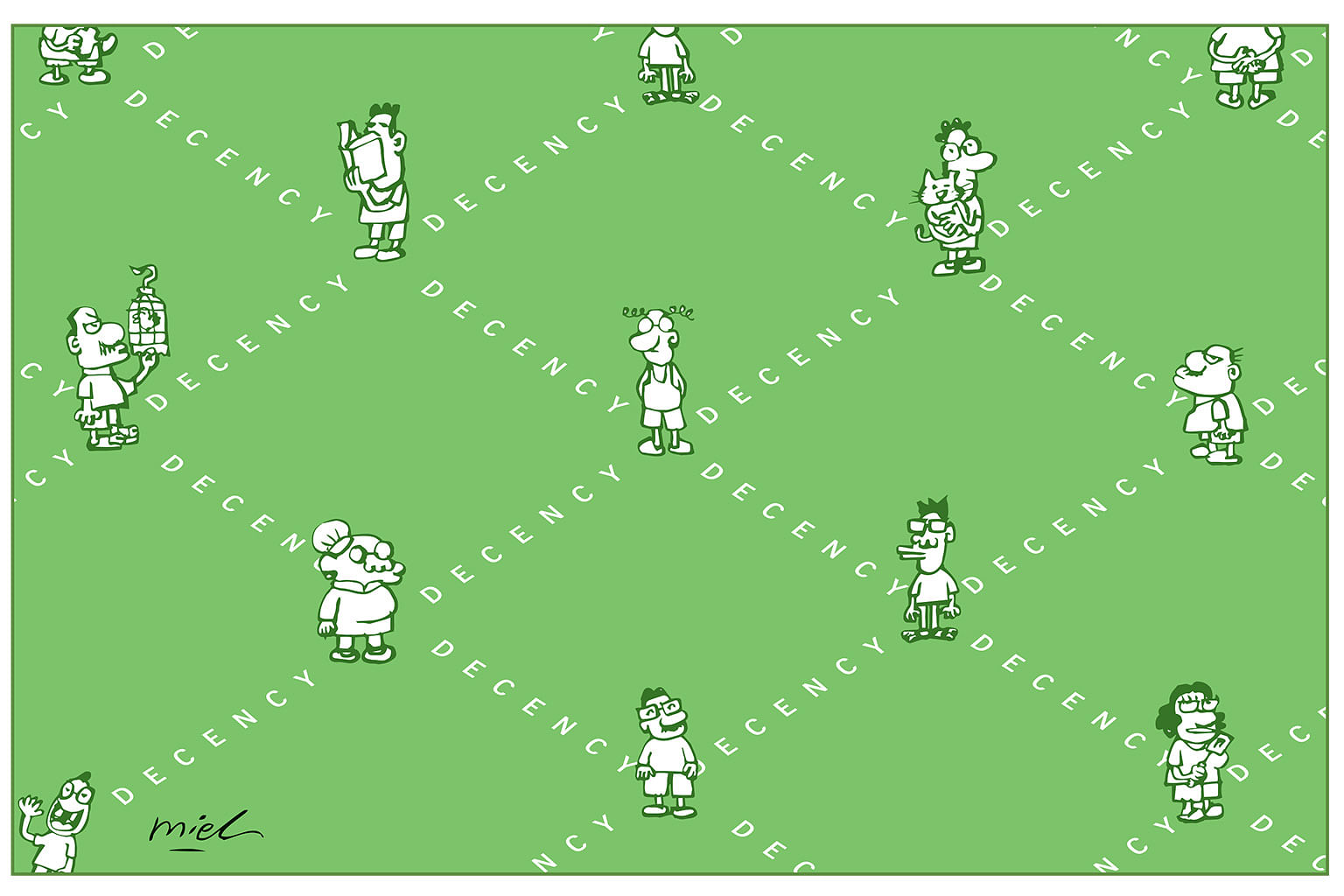"It's not like Armageddon yet," said Ronnie, one of the young partners of the car workshop where I had taken my car for some much-needed repairs.
These days, it is increasingly impossible to talk about anything but the coronavirus pandemic. We stood talking while scrupulously maintaining that 1m or so of space between us - we were taking "social distancing" seriously.
He had workers from China who were stranded when Singapore shut its borders to travellers from China, following the outbreak of the virus in Wuhan there. Now that they are back, some of his other workers are stuck on both sides of the Causeway after Malaysia's hasty lockdown. Business is also down, but despite his labour and financial problems, Ronnie was relaxed and reflective.
Of his Malaysian workers who suddenly found themselves without a roof over their heads as they could no longer commute home, he has put them up in his own home and those of his two other business partners. "We have to look after them," said Ronnie, quietly. "They are like family, and we will dig into our own savings if it's necessary to help them."
Ronnie is right: The virus that is sweeping across the world isn't Armageddon, but it does feel biblical, even apocalyptic, with entire populations within cities being quarantined; schools, restaurants, entertainment venues, places of worship and cultural institutions closed; the global aviation industry grounded. Countries have sealed their borders, economies are tottering.
Many healthcare systems are in danger of collapsing: Doctors and nurses are working to exhaustion and getting infected; some have died (a recent article by Italian physicians in The Lancet suggested that 20 per cent of healthcare workers in Lombardy had become infected); and in many hospitals, there are not enough intensive care units, not enough respirators, not enough beds, not enough face masks and other personal protective equipment, and not enough test kits.
It's a tragic situation where doctors face the grim ethical dilemma of deciding which patients get intensive care and which are left to die. From Spain came disturbing reports of residents in care homes being left "dead and abandoned". Throughout all this is the constant narrative of rising levels of contagion everywhere and the mounting daily body count - arriving like dispatches from an increasingly desperate and wasteful war with an unseen implacable enemy that seems to be lurking anywhere and everywhere and, even more disconcertingly, invisibly within people.
AN ARRAY OF FEARS
Few of us have experienced anything like this.
The closest comparison is the Spanish flu, so-called because the first widely reported outbreak occurred in Madrid in May 1918. By spring of the following year, the virus had burnt itself out, but not before a third of the world's population had been infected, leaving at least 50 million dead. One hundred years later and despite the tremendous advances in medical knowledge and its technology, we are perhaps feeling that same helplessness and gut-tightening fear that people then had felt.
And in our digital age, that fear is even more contagious, widespread, amplified and belittling. Social media streams are filled with pictures of panic-buying: denuded supermarket shelves, agitated shoppers going at each other, and supermarket trolleys piled high with supplies (including, of course, the much-coveted toilet rolls). There is a German word for it: hamsterkauf, meaning to shop like a nervous hamster whose cheeks bulge with stored food.

That fear has morphed into something even nastier. Covid-19 is perceived in some people's minds as a disease that originated from Chinese people eating exotic animals in Wuhan - never mind that the true origin of this marauding virus is still unclear.
Anyone who looks Chinese is held culpable and seen as a carrier of this disease. Racist scapegoating, abuses and attacks have happened in London, New York and even in India, where Indians from the country's north-east were set upon because they "looked Chinese".
Living in Chinese-majority Singapore, I have at least been spared that indignity and threat, but I am beset with other fears. Each time I sneeze, cough or feel that scratchiness at the back of my throat, there is that frisson of fear. I fear that I may move from being a doctor to becoming a patient who faces the real possibility of dying a terrifying death akin to drowning. And I'm terrified of unknowingly infecting others.
But amid these fears is a feeling I find difficult to describe, one that I feel in my head and chest. Something more than that wistful and leaden sense of loss and sadness for that everyday normalcy that is vanishing with bewildering speed. And it is a dysphoria that seems pervasive and shared with many of my friends - as if the virus has emitted a malevolent miasma that has seeped into our collective psyche.
TURNING TO CAMUS
To escape this prison of my fears and to find some means of understanding and describing how I feel, I turn - as I'm inclined to do in trying times - to reading fiction and poetry which dispense much needed relief and solace.
When the severe acute respiratory syndrome struck us 17 years ago, I'd read French existential writer Albert Camus' novel The Plague, which, on the surface, is about the effects of a deadly plague within the quarantined walls of a community. Recently, I re-read it and found this line: "A feeling normally as individual as the ache of separation from those one loves suddenly became a feeling in which all shared alike and - together with fear - the greatest affliction of the long period of exile that lay ahead." Not quite what I feel, but close enough.
Published in 1947, the novel is about a plague that strikes the French-Algerian coastal town of Oran. And though it has often been read as a metaphorical fable about the Nazi occupation of France and about the "virus of fascism", it is that literal tale of a community in extremis from a deadly outbreak of plague that has struck a chord with many in this present age of the coronavirus. (Sales of this novel surged recently and numerous think-pieces on this pandemic made references to it.)
DECENCY IN DARK DAYS
The narrator of the story, Dr Bernard Rieux, is a conscientious local doctor who heads a hospital and commits himself to fighting the plague, helping its victims and alleviating their suffering, which he sees quite simply as the sole purpose of his vocation. He is a pragmatic man who has come to realise that: "It may seem a ridiculous idea, but the only way to fight the plague is with decency." And when asked what decency is, he replies: "Doing my job."
Camus also writes elsewhere in the novel that what is true of all the evils in the world is also true of the plague - that it helps human beings rise above themselves. Self-preservation is most people's instinctive response when faced with a calamity and it can make them act selfishly and badly.
On the other side of this, there is a bracing body of sociological research that has shown that people do act decently despite being caught in these appalling and catastrophic situations, and have acted individually or banded together to help and care for family, friends and strangers alike; some had been courageously self-sacrificial.
In 1665, a trader brought bubonic plague in a bundle of flea-infested cloth from London, which was then in the grip of the Black Death, to a village called Eyam, which lay on an important trade route between Sheffield and Manchester.
Soon after, people in the village started dying. Knowing that if they were to flee to the cities, they would bring the plague to inhabitants there and cause the death of thousands, the residents of Eyam, led by their rector, chose to self-quarantine themselves despite being well aware that with no escape, many more would be infected and would perish.
By the time the quarantine was lifted 14 months later, 260 of Eyam's estimated 800 residents had died, including the rector's wife, but their collective self-sacrifice worked: The plague never got to nearby towns.
Since the outbreak of the Covid-19 infection, countless doctors, nurses and other healthcare workers on the front lines of this onslaught have been - in accordance with Dr Rieux's definition of decency - doing their job and putting themselves in harm's way to help and save patients and protect the rest of us.
As for the rest of us, doing the decent thing in this instance requires no heroics, but a responsible compliance with those things that would at least help "flatten the curve" and not overwhelm our already overstretched healthcare system. The decent thing for us to do is to follow the mandate of social distancing, stay home, practise good personal hygiene, have a good measure of personal restraint and discipline, and show consideration towards others.
Despite having to keep our physical distance from one other and in such isolating circumstances, we are all in this together whether we like it or not, and what affects one person will affect many others.
In the dark days to come, it is decency that we should stock up on - not toilet rolls. We need to have that decency to think not only of ourselves but also of others, to work together, and to look out and care for one another.
And it is decency that would also help us through this terrible and frightening time. Of late, I find myself turning repeatedly to this quietly heartening verse by Irish poet John O'Donohue:
This is the time to be slow,
Lie low to the wall
Until the bitter weather passes.
Try, as best you can, not to let
The wire brush of doubt
Scrape from your heart
All sense of yourself
And your hesitant light.
If you remain generous,
Time will come good;
And you will find your feet
Again on fresh pastures of promise,
Where the air will be kind
And blushed with beginning.
• Professor Chong Siow Ann, a psychiatrist, is vice-chairman of the medical board (research) at the Institute of Mental Health.











